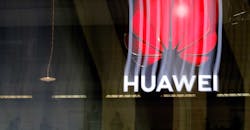Five Months After Huawei Export Ban, US Companies Are Confused
Five months after the Trump administration blacklisted China’s Huawei Technologies Co., its business seems alive and well while American firms still don’t know whether they can work with the Chinese company or not.
The Department of Commerce in May added Huawei to what’s known as the entity list in an effort to block U.S. companies from selling components to China’s largest technology company, which it accuses of being a threat to America’s national security. Huawei has denied those claims.
Despite those actions, Huawei reported last week that its revenue grew 24% in the first ninth months of 2019, boosted by a 26% jump in smartphone shipments. There are also signs that U.S. efforts to block the company from the development of 5G technology have yet to make a big dent: Huawei said it has signed more than 60 5G commercial contracts to date worldwide.
Licenses
The entity listing, which requires American firms to obtain a government license in order to sell to blacklisted firms, has caused complications for U.S. companies.
Tech leaders and their lawyers have argued for months in closed-door meetings with Trump administration officials that the blacklisting of Huawei, one of their biggest customers, is detrimental to their businesses. Many industry executives are confused about the administration’s end goals and haven’t been able to get clarity on when license approvals will be offered despite those discussions, according to several people familiar with the matter.
President Donald Trump said in June after meeting with Chinese President Xi Jinping in Osaka that he’d “easily’’ agreed to allow American firms to continue certain exports to Huawei. Weeks later Trump said he’d accelerate the approval process for licenses but none have been granted so far. The president as recently as this month green-lit the approval of licenses in a meeting with advisers, according to people familiar with the matter, but an announcement has yet to be made.
The Commerce Department, in a statement, said it has received more than 200 license requests about Huawei and its affiliates. “Given the complexity of the matter, the interagency process is ongoing to ensure we correctly identified which licenses were safe to approve,” according to the statement. “Moreover, the Temporary General License remains in effect and was recently renewed.”
Sales Impact
Micron Technology Inc.’s Chief Executive Officer Sanjay Mehrotra said in September that the lack of decision on its license applications could result in a worsening decline in sales over the coming quarters. The company gave a disappointing quarterly profit forecast last month, pointing in part to the Huawei restrictions. Broadcom Inc. in June also slashed its annual forecast, citing the U.S.-China trade war and disruption to its relationship with Huawei.
One of the industry’s main arguments for allowing shipments of non-national security sensitive items is that Huawei can buy some of those components from competitors around the world, including South Korea, Japan and Taiwan.
“Unless the ban succeeds in ‘killing’ Huawei, the result will be reduced U.S. global market share in a number of technology areas, something that will hurt, not help U.S. tech competitiveness,’’ said Robert Atkinson, president of ITIF, a Washington-based think tank.
Workarounds
Some firms have resumed shipments to Huawei even without a verdict on license requests. After a closer look at the rules since May, they determined they could continue supplying products based on an export control law. The rule doesn’t subject a product or service to the entity listing’s constraints if a company can prove that a piece of technology owes less than 25% of its origins to U.S.-based activities.
Micron in June said it had resumed some memory chip shipments to Huawei. Intel Corp., the U.S.’s biggest chipmaker with plants in Oregon, New Mexico and Arizona, has as well. The company also has facilities in Ireland, Israel and China -- enabling it to argue that a chunk of the intellectual property in its chips isn’t created in the U.S.
“We know many U.S. companies continue to ship to Huawei but do so using murky workarounds by way of other countries and third parties,’’ said Samm Sacks, a cybersecurity fellow at New America, a think tank. “It’s questionable whether the Huawei ban has helped U.S. national security so much as created a messy tangle of new problems.’’
Atkinson cautioned not to over-interpret Huawei’s sales figures because the company has been stockpiling supplies for a while, in anticipation of the U.S. action. He said fourth quarter sales will be a more accurate indicator of the export ban’s impact, or whether the company has largely circumvented it.
Huawei has said it expects U.S. export restrictions to reduce annual revenue at its consumer devices business by about $10 billion, in part because Google can no longer supply Android updates and apps from Gmail to Maps for the Chinese company’s newest handsets.
U.S.-China Deal
Trump has indicated on various occasions that he’d be willing to consider removing the ban on Huawei for better terms in a trade agreement, drawing sharp criticism from China hawks on Capitol Hill.
With the U.S. reaching a “phase one’’ deal with China earlier this month, the big question now is whether Trump will consider removing Huawei from the entity list or ease restrictions. When announcing the accord on Oct. 11, the administration said the issue wouldn’t be part of this initial pact but that it could be a part of phase two.
About the Author
Bloomberg
Licensed content from Bloomberg, copyright 2016.
